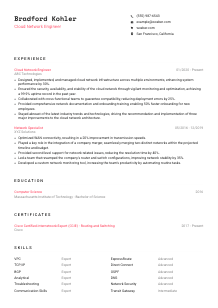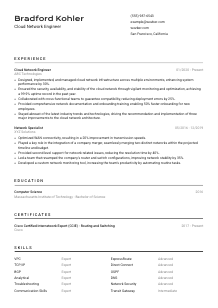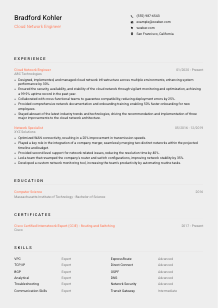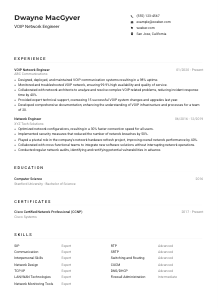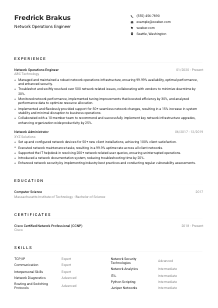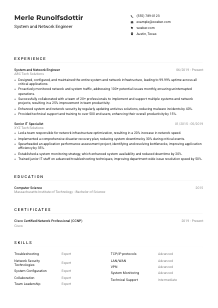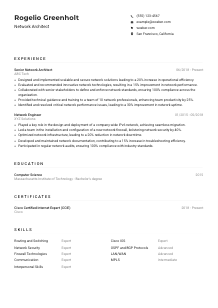Cloud Network Engineer CV Example
Building networks in the cloud, but your CV seems stranded on-premises? Navigate this Cloud Network Engineer CV example, optimized with Wozber free CV builder. See how you can architect your cloud connectivity expertise to meet job criteria, guiding your career path to where the sky's the only limit!
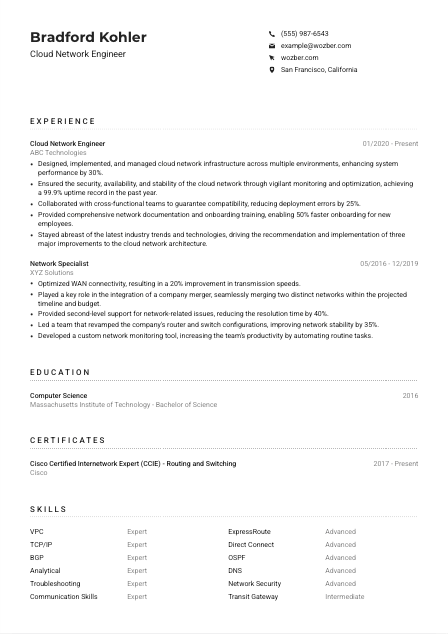
How to write a Cloud Network Engineer CV?
Greetings, aspiring Cloud Network Engineer! In today's competitive job landscape, standing out is not just desirable—it's essential. Your CV is more than a document; it's a testament to your prowess in cloud networking, your achievements, and your potential. By leveraging Wozber's free CV builder, this guide is here to steer you through the nuances of tailoring a CV that resonates with the specific demands of your dream role.
Ready to embark on a journey that transforms your CV into an interview magnet? Let's navigate the clouds of opportunity together!
Personal Details
The Personal Details section is your digital handshake, setting the tone for your CV. Here's how to tailor it specifically for the Cloud Network Engineer role, ensuring it's not only impactful but also precisely aligned with job requirements.
1. Name and Branding
Begin with your name, ensuring it commands attention with a clean, large font. Think of your name as your personal branding—it should stand out, creating a strong first impression.
2. Job Title Synchronization
Directly under your name, position the title 'Cloud Network Engineer' to align with the job you're targeting. This signals to hiring managers right off the bat that you're a fit for the role.
3. Essential Contact Information
List your most accessible phone number and a professional email address. A format like firstname.lastname@email.com keeps it straightforward and polished. If you're located in San Francisco, as the job requires, make sure this is clearly highlighted, reinforcing your suitability and eliminating relocation concerns.
4. Online Presence
If relevant, include a link to a professional profile or personal website where more of your work or professional accolades are showcased. Ensure this content is congruent with your CV, presenting a coherent professional image.
5. Privacy Focused
Omit personal details like age or marital status that are not relevant to your professional qualifications. Keeping your CV focused on professional aspects protects your privacy and ensures you're judged solely on your merits.
Takeaway
Think of the Personal Details section as the opening act of your professional show. It's about striking the right notes of professionalism and job alignment, setting the stage for the impactful narrative that follows.





Experience
The Experience section is where you illuminate your path as a Cloud Network Engineer, showing not just where you've been, but how you've excelled. Here's how to make your journey both resonant and relevant, mirroring the job at hand.
- Designed, implemented, and managed cloud network infrastructure across multiple environments, enhancing system performance by 30%.
- Ensured the security, availability, and stability of the cloud network through vigilant monitoring and optimisation, achieving a 99.9% uptime record in the past year.
- Collaborated with cross‑functional teams to guarantee compatibility, reducing deployment errors by 25%.
- Provided comprehensive network documentation and onboarding training, enabling 50% faster onboarding for new employees.
- Stayed abreast of the latest industry trends and technologies, driving the recommendation and implementation of three major improvements to the cloud network architecture.
- Optimised WAN connectivity, resulting in a 20% improvement in transmission speeds.
- Played a key role in the integration of a company merger, seamlessly merging two distinct networks within the projected timeline and budget.
- Provided second‑level support for network‑related issues, reducing the resolution time by 40%.
- Led a team that revamped the company's router and switch configurations, improving network stability by 35%.
- Developed a custom network monitoring tool, increasing the team's productivity by automating routine tasks.
1. Job Requirements Reflection
Start by dissecting the job description. For a Cloud Network Engineer, key experiences might include managing cloud network infrastructure, security optimisation, and cross-functional collaboration.
2. Highlight Pertinent Roles
Structure this section chronologically, placing your most relevant and recent experience first. For each role, list your title, the company, and dates of employment, showcasing your upward trajectory within the cloud networking sphere.
3. Impactful Achievements
Under each role, highlight your achievements that closely align with the role's requirements. For example, if you ensured '99.9% uptime,' this directly speaks to the demand for reliability in the job description.
4. Quantify Your Success
Numbers talk. They offer tangible evidence of your impact. Did you enhance system performance by 30%? Include it! Quantifiable achievements grab attention and make your contributions concrete.
5. Relevance is Key
Keep every point targeted to the Cloud Network Engineer's role, omitting unrelated achievements, no matter how impressive they might be outside this context. Aim for concise, high-impact statements that underscore your suitability.
Takeaway
Craft your Experience section as a beacon, guiding hiring managers through your professional journey. Illuminate your path with precision and relevance, laying out your invaluable experiences as stepping stones toward this new role. Each achievement is a testament to your readiness and eagerness to excel as a Cloud Network Engineer.
Education
Your Education section does more than list degrees; it underscores the foundation of your expertise. Here's how to sculpt this section to reflect your qualifications for the Cloud Network Engineer position distinctly.
1. Align with Role Requirements
The job calls for a 'Bachelor's degree in Computer Science, Information Technology, or a related field.' Ensure your education aligns with this, listing your degree clearly to match the role's requirements.
2. Simple Structure
Maintain clarity with a straightforward layout: Degree, Field, University, and Graduation Date. This helps hiring managers quickly verify your educational background against their criteria.
3. Degree Specificity
To echo the job requirements, if you hold a 'Bachelor of Science in Computer Science,' list it verbatim. Precise alignment with the job description here can set you apart early in the screening process.
4. Course Focus
If recent or particularly relevant, mention coursework that directly pertains to cloud networking. Although not always necessary, this can add depth to your qualifications for more specialized roles.
5. Additional Accolades
Include relevant honors, clubs, or projects if they enhance your candidacy, especially for entry-level professionals. Demonstrating active engagement in your field resonates well with potential employers.
Takeaway
The Education section is your academic narrative, conveying not simply what you've learned but how your journey aligns with your professional aspirations. Let each credential be a building block in constructing a compelling case for why you are the right fit for the Cloud Network Engineer role.
Certificates
Certificates highlight your commitment to professional growth and specialized skills. For Cloud Network Engineers, they can differentiate you in a field of qualified candidates. Let's navigate how to present your certifications effectively.
1. Reflect on Role Relevance
Although the job description might not list specific certifications, selecting ones highly relevant to cloud networking can bolster your application. For instance, 'Cisco Certified Internetwork Expert (CCIE) - Routing and Switching' and 'Certified Cloud Network Engineer (CCNE)' directly reflect the job's technical requirements.
2. Focus on Pertinence
Quality trumps quantity. Highlight certifications that speak directly to the core competencies of the role. This shows that you're not only qualified but also dedicated to excellence in your field.
3. Date Details
Include the acquisition or validity period for each certification, particularly if they are recent. This demonstrates your ongoing commitment to staying current in a rapidly evolving field.
4. Stay Current
Technology and best practices evolve swiftly. Continuously seek out professional development opportunities to ensure your certifications—and your skills—remain on the cutting edge.
Takeaway
Your certificates are badges of honor, marking your progression and specialization in the cloud networking arena. Showcase them not just as achievements, but as tangible evidence of your enduring commitment to your craft.
Skills
The Skills section is your professional arsenal at a glance. For a Cloud Network Engineer, crafting this section with precision is key. Let's dive into aligning your skills with the demands of your targeted role.
1. Extract From Job Description
Pinpoint both explicit and inferred skills from the job listing. Skills like 'VPC,' 'TCP/IP,' and 'network security' are clearly vital, but don't overlook soft skills like 'analytical' and 'troubleshooting' capabilities.
2. Match and Prioritize
Align your skills with those requested in the job description, listing those that match first. This immediate resonance with the job's requirements signals your capability and focus.
3. Organized Presentation
Resist the urge to list every skill. Prioritize a blend of hard and soft skills most relevant to the Cloud Network Engineer role, ensuring a neat, easily digestible layout for the hiring manager to scan.
Takeaway
Your Skills section isn't just a list; it's a strategically arranged presentation of your professional toolkit. Each skill you include is a testament to your readiness for the challenges of the Cloud Network Engineer role. Display them with pride and precision.
Languages
Multilingualism can be a significant advantage, reflecting global competence and communication skills. For Cloud Network Engineers, especially in diverse environments, linguistic abilities can enhance your appeal to employers.
1. Matching Job Specifications
Initially, determine if the job posting mentions language requirements. In the case of our Cloud Network Engineer example, 'English proficiency is a fundamental requirement.' Highlighting your fluency in English is crucial.
2. Prioritize Key Languages
List any languages specified in the job posting at the top of your section, clearly stating your proficiency level to align with the job's requirements.
3. Additional Languages
Include other languages you know, even if not mentioned in the job description. This can demonstrate versatility and potential for roles requiring or valuing global communication skills.
4. Proficiency Levels
Be honest about your language skills, using terms like 'native,' 'fluent,' 'intermediate,' and 'basic' to describe your proficiency. This clarity is appreciated and avoids any potential miscommunications.
5. Consider the Role's Reach
For positions with an international scope or those in multinational companies, your multilingual abilities can significantly bolster your application, showcasing not just linguistic skills but cultural adaptability.
Takeaway
Your linguistic capabilities are not merely personal attributes; they are professional tools that enable broader communication and understanding. Whether your language skills are a direct requirement or a complementary asset, they contribute to your unique profile as a Cloud Network Engineer.
Summary
The Summary section is your opportunity to shine in a nutshell, combining your professional narrative with your aspirations. For a Cloud Network Engineer, this section is the gateway to catching and holding the hiring manager's attention.
1. Job Essence Grasp
Begin by internalizing the essence of the Cloud Network Engineer role. Understanding the core responsibilities and expectations is key to crafting a summary that resonates.
2. Potent Introduction
Introduce yourself as a seasoned Cloud Network Engineer, highlighting your years of experience and the core areas you've excelled in, such as designing, implementing, and managing network infrastructure in cloud environments.
3. Key Achievements and Skills
Incorporate a concise list of your most relevant skills and significant achievements. Mention achievements like 'enhanced system performance by 30%' and skills in 'VPC,' 'TCP/IP,' and 'network security' to directly respond to the job's needs.
4. Conciseness
Your summary should be brief yet impactful. Within 3-5 lines, aim to encapsulate your professional identity and why you're the perfect candidate for the Cloud Network Engineer role.
Takeaway
The Summary section is your CV's hook, drawing in the hiring manager with a compelling snapshot of your expertise and ambition. Tailoring it to the Cloud Network Engineer role, you're immediately showcasing your alignment and readiness for the challenges ahead.
Launching Your Cloud Network Engineer Journey
Congratulations! You are now equipped with the insights to craft a Cloud Network Engineer CV that doesn't just meet the mark but sails above it. Your CV is your narrative, distinctly told through each section, from Personal Details to the Summary.
Utilizing Wozber's free CV builder, ATS-friendly CV templates, and ATS CV scanner, you're set to create a CV that not only ticks all the boxes but showcases your unique professional story. Embark on your journey with confidence—the sky's the limit!

- Bachelor's degree in Computer Science, Information Technology, or a related field.
- Minimum of 5 years of experience in network engineering with a focus on cloud environments.
- Proficiency in implementing and managing cloud networking services such as VPC, ExpressRoute, Direct Connect, and Transit Gateway.
- In-depth knowledge of networking protocols including TCP/IP, BGP, OSPF, and DNS.
- Strong analytical, troubleshooting, and communication skills.
- English proficiency is a fundamental requirement.
- Must be located in San Francisco, California.
- Design, implement, and manage cloud network infrastructure across multiple environments.
- Ensure the security, availability, and performance of the cloud network through monitoring and optimization.
- Collaborate with cross-functional teams to ensure compatibility and support for business applications and services.
- Provide network documentation, trainings, and support to both internal teams and external stakeholders.
- Stay updated with the latest industry trends and technologies, recommending and implementing improvements to the cloud network architecture.





